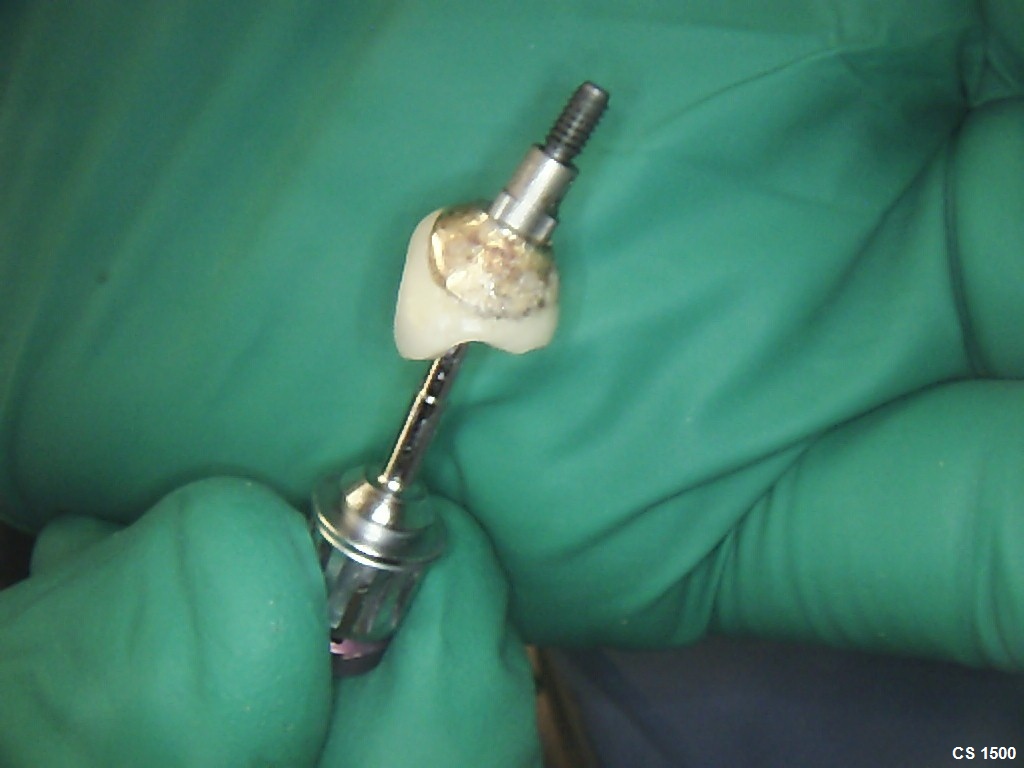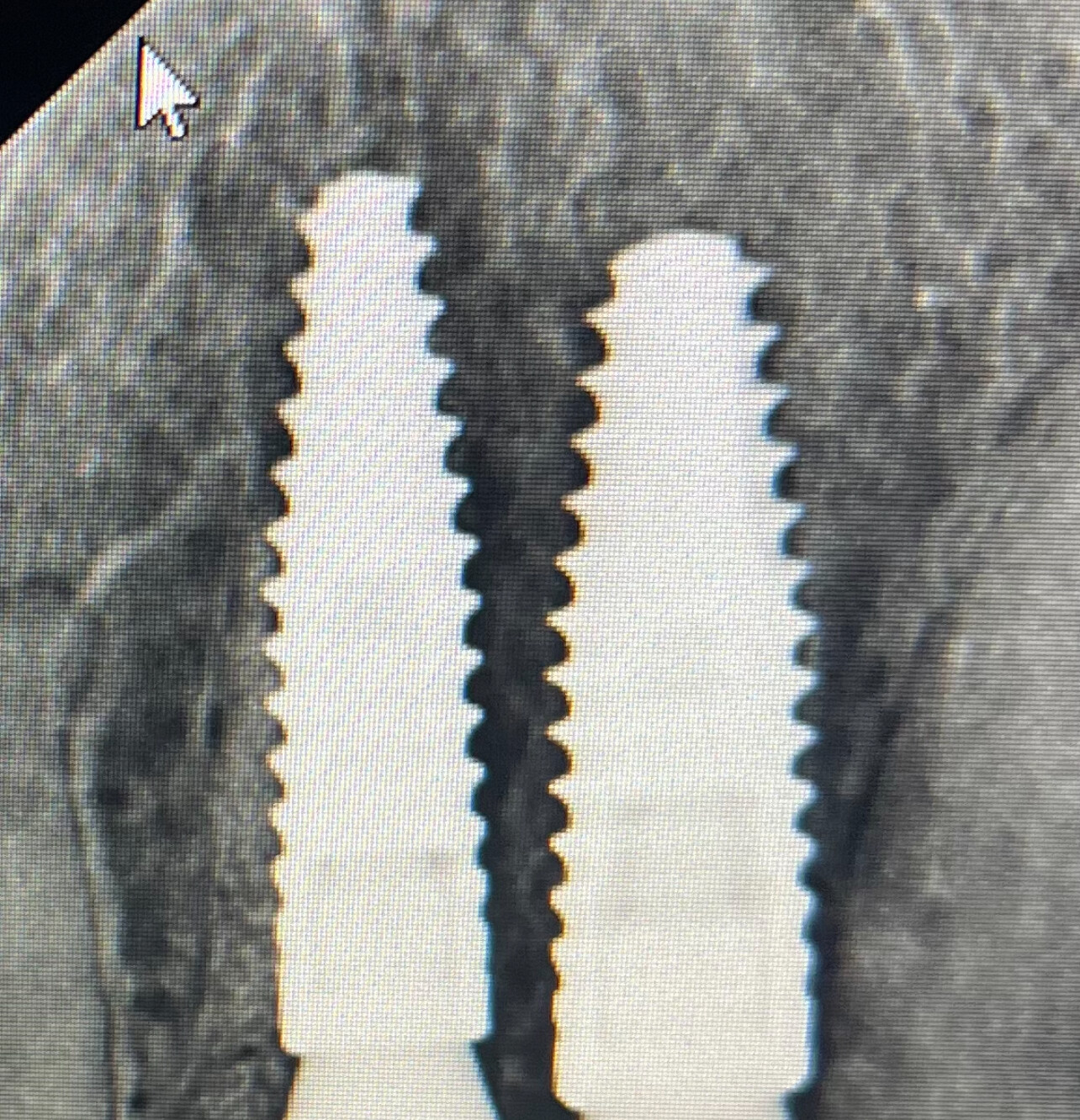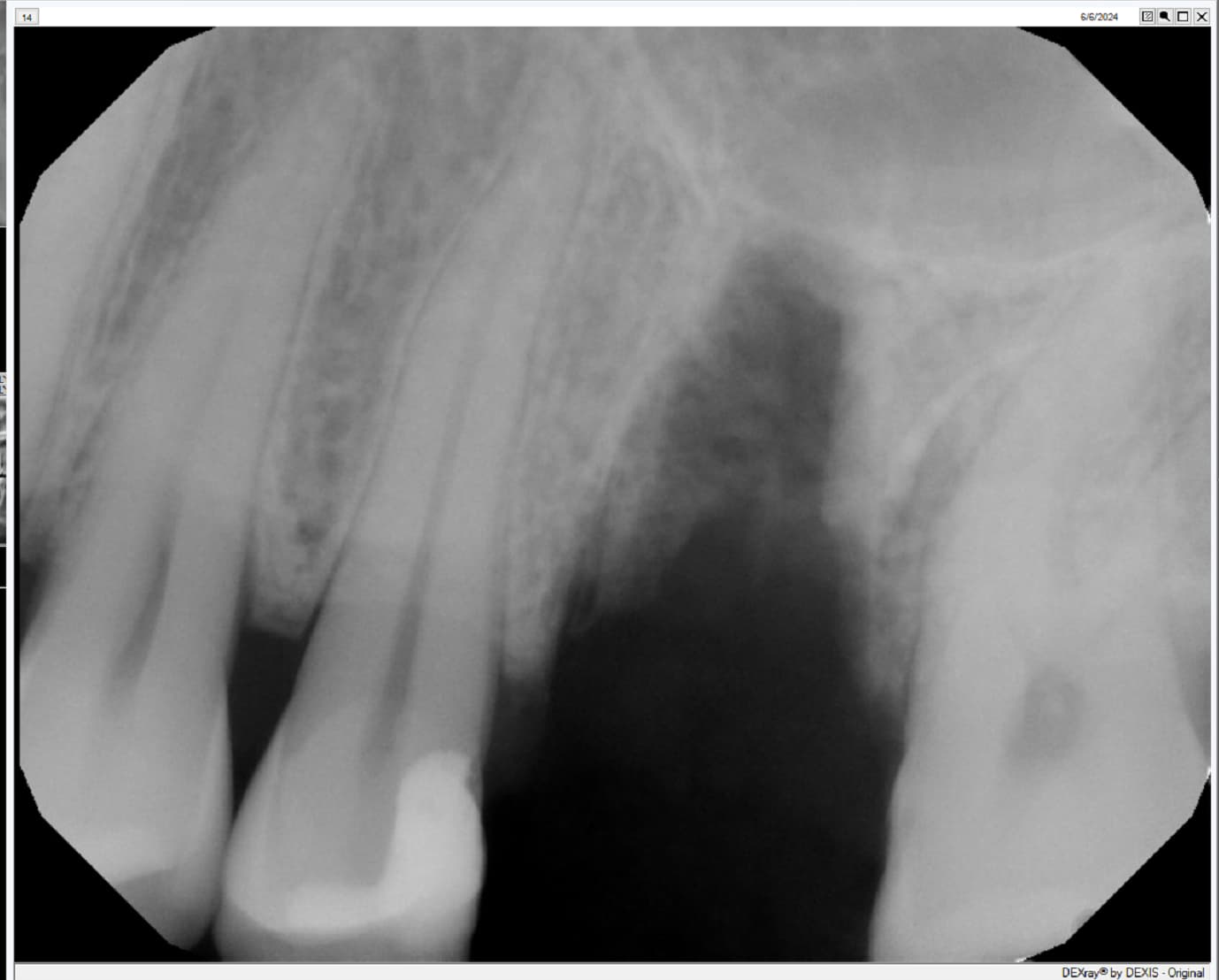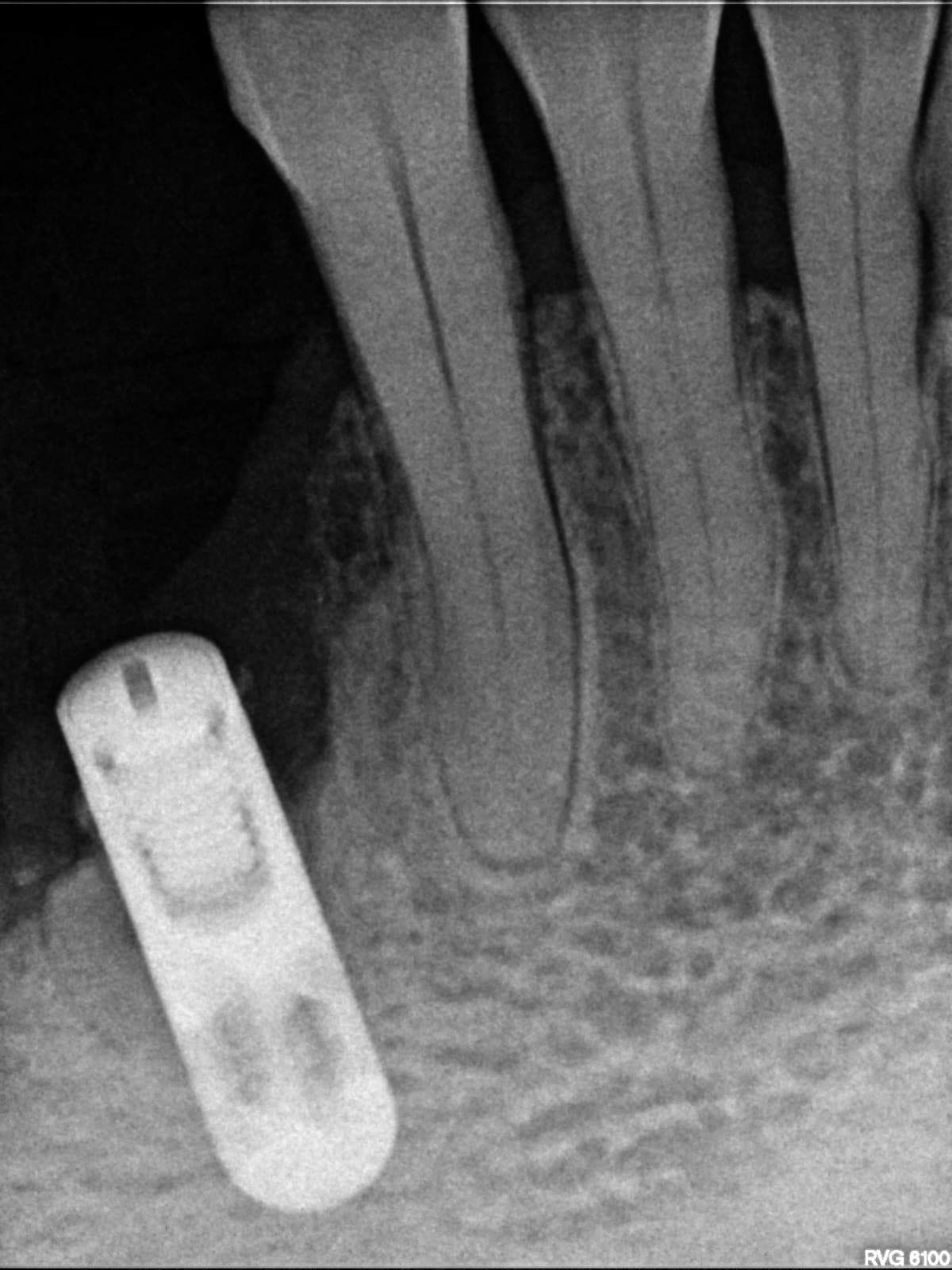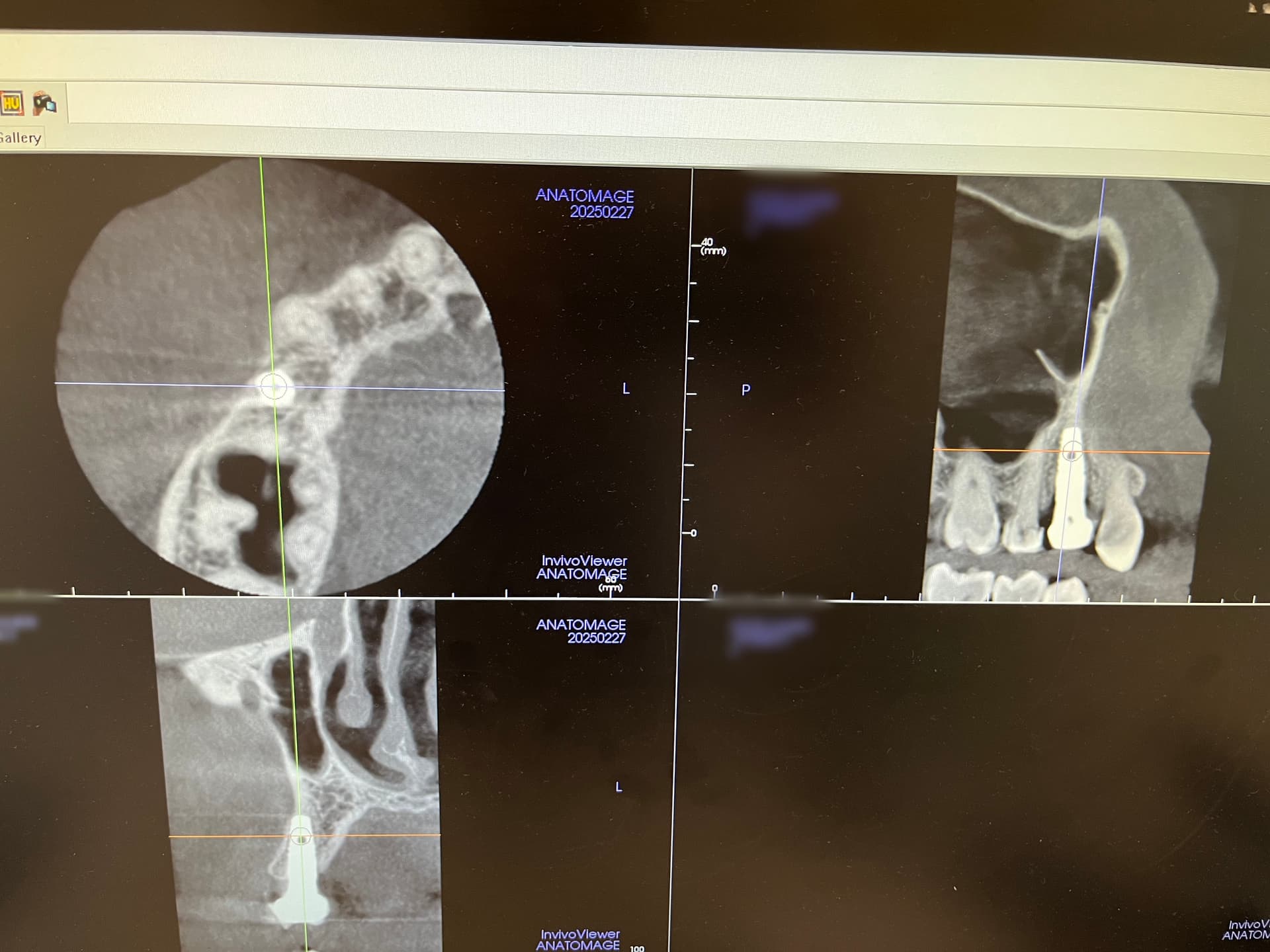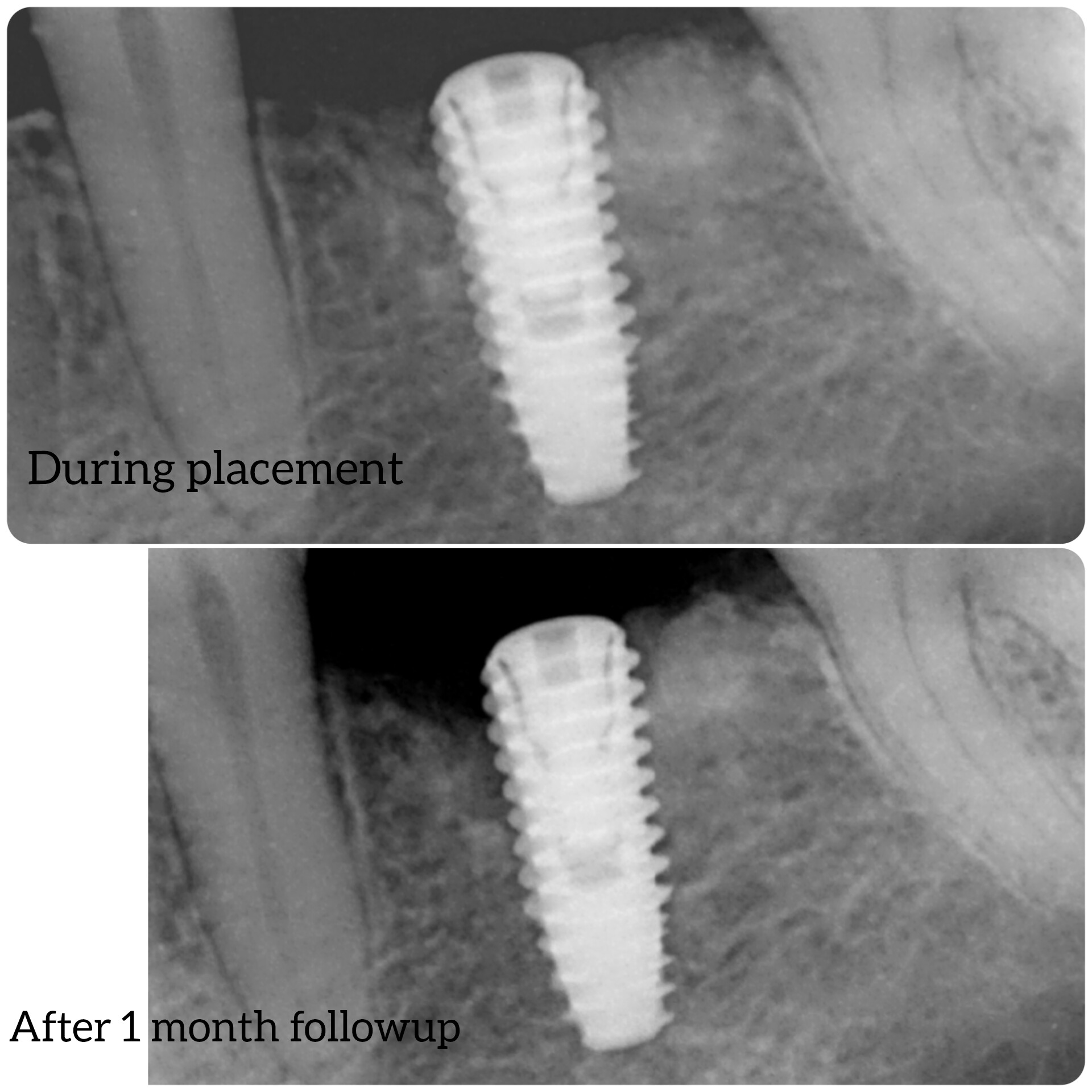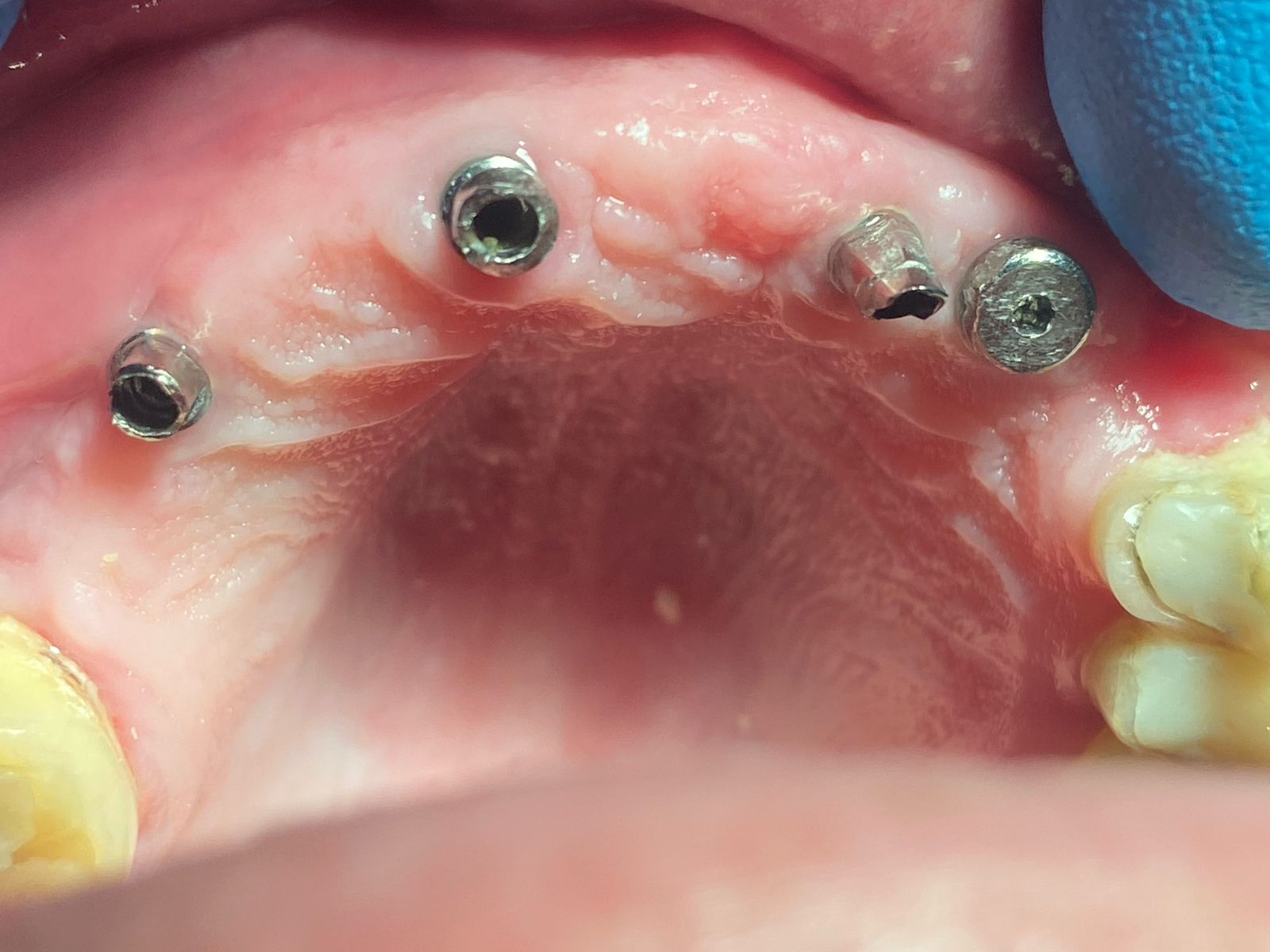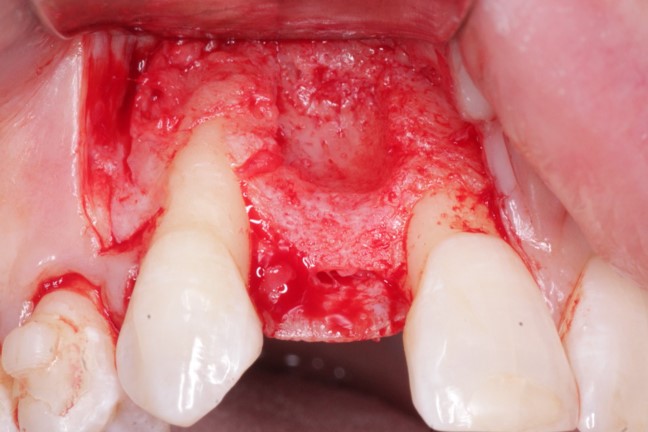Implants Following Radiation Treatment?
Dr. S. asks:
I am going to place dental implants in the mandible. The patient had radiation treatment for cancer therapy 20 years ago. Is it safe now for me to place the dental implants? Will I need to refer the patient to have hyperbaric oxygen treatment? Will there be a decreased chance of osseointegration? Thanks for any help.
29 Comments on Implants Following Radiation Treatment?
New comments are currently closed for this post.
3rd Molar Slayer
6/4/2007
Dear Dr. S,
In my reply to your question please do not misunderstand my writing and passion as an attack or preaching. I am strictly trying to convey the gravity of the situation at hand. (much like I did many months ago with a similar question).
The answer to placing implants in an irradiated mandible is ABSOLUTELY NOT! DO NOT PLACE THESE IMPLANTS IN THE MANDIBLE. I URGE YOU! You have a lot to consider prior to doing any form of surgery in patients that are post-radiation. This is a case where the surgery solely belongs in the hands of the ORAL & MAXILLOFACIAL SURGEON. If your OMFS decides it is safe to proceed with the implants, you will have plenty to do on the restorative end. I urge you that this is not a case for the Periodontist either. The risk of complications are very high with this patient and they can only be managed by an Oral Surgeon.
Please read my warnings closely...
1) Patients with a history of Radiation Therapy get WORSE WITH TIME... NEVER BETTER. The surgical literature and insurance statistics show that the most common cause of Osteoradionecrosis is the "general dentist" who has extracted a tooth or placed an implant on a patient with "previous radiation therapy a long time ago."
2) Patient's who have had radiation therapy become HYPOXIC, HYPOVASCULAR, and HYPOCELLULAR. This is the physio-pathologic mechanism that is behind the risk of OSTEORADIONECROSIS.
3) Hyperbaric Oxygen Therapy, in my mind, is the standard of care for your patient. In some circles it is controvercial, but the truth of the matter is, that if you were faced with this situation and the patient was your own mother in the chair, you would want the HBO Therapy prior to any surgery on a post-radiation mandible.
4) Also the RADIATION DOSAGES and PORTS must be known and evaluated. This should be available in the patient's medical records.
The sequelae of Osteoradionecrosis lead to significant morbidity. The treatments can involve hospitalization, further HBO Therapy, Resection of the mandible, Reconstruction with Microvascular Free Flaps... Basically its a miserable course for your patient.
Finally, there is no reason to expose yourself, your practice and your livlihood to a potentially disasterous litigation.
I am completely in favor of General Dentists placing and restoring implants. I'm a great advocate for it. But there is a line that has to be drawn from time to time and this is one of those cases. If you are competent to place implants, please do so on your typical/average and healthy patient... but by all means, stay clear of Post-Radiation Therapy Patients. (I'm also going to urge you to be extremely careful with patients on Bisphosphonate Therapy).
Best of luck to you. Happy to discuss this issue further if you wish.
Sincerely,
Dr. T
3rd Molar Slayer
Dr. Mehdi Jafari
6/5/2007
Osteoradionecrosis is a real nasty complication of the radiotherapy in the treatment of head and neck cancer. Clinical manifestations of osteoradionecrosis may include continuous disturbing pain, orofacial fistula, exposed necrotic bone, pathologic jaw fracture, and purulence. It is more commonly seen in the mandible than in the maxilla due to the relatively decreased vascularity and increased bone density of the mandible. The mandible often receives a greater dose of radiation than the maxilla for the latter reason. Radiation dose is a contributing factor to the development of osteoradionecrosis as well as tumor location, dental trauma, the premorbid dentition and neglected oral health, or concomitant chemoradiotherapy if ever done. Sometimes, the question is that what happens when a patient already having implants in his/her mouth, develops a cancer, needing irradiation to the jawbone and what would the effect of these implants on the surrounding bone during radiotherapy of oral, nasal, and paranasal neoplasms be? Radiation scatter can cause both soft and hard tissue complications in the oral cavity making scattered radiation an important factor in head and neck region radiotherapy planning. It has not been even proved that a local overdose on the order of 15% to 21% will cause a significant increase in the incidence of bone necrosis around the osteo-integrated titanium implants, hence, they do not need to be removed before radiotherapy. As the primary osseous complication arising from radiation injury, osteoradionecrosis has clinically been defined in the literature as irradiated bone that has failed to heal in twelve weeks. As a matter of fact, it is a non-healing wound or a slow-healing radiation-induced ischemic necrosis of the bone with associated soft tissue necrosis even without having any sign of tumor cell seeding or metastasis. Dose enhancement factor that may contribute to osteoradionecrosis are always higher than 6000 cGy delivered by 25-MV x-ray machines. To handle these cases, a pre-surgical HBO diving protocol is mandatory, and no doubt that only a specialist oral and maxillofacial surgeon should take care of them. For those cases that the amount of received radiation is equal to 4000 cGy or less, and a time lapse(of twenty years for your patient), then go for it, and don’t be afraid of losing any litigation.
3rd Molar Slayer
6/5/2007
While I agree with most of what Dr. Jafari has written, I do disagree with his statement:
"For those cases that the amount of received radiation is equal to 4000 cGy or less, and a time lapse(of twenty years for your patient), then go for it, and don’t be afraid of losing any litigation. "
This is only partially correct at best. YES the risk of O.R.N. is somewhat decreased when 4000cGy or less has been provided (but this still needs to take into account the Form/Dose/and Ports {location and method} of radiation). This does not completely negate the risk of O.R.N.
NO MATTER THE RADIATION DOSE... THE CONDITION OF THE IRRADIATED TISSUES NEVER IMPROVES. IT BECOMES WORSE WITH TIME. Please do not be fooled by the misconception that time heals everything. It does not heal irradiated tissue. The tissues are compromised! The mandible is particularly susceptible to this because the tissues are HYPOXIC, HYPOCELLULAR, and HYPOVASCULAR. The blood supply is compromised because it only comes from a now affected Inferior Alveolar Artery (Hypovascular!) and from the overlying periosteum.
Finally, Dr. Jafari is not an attorney. His statement about proceeding wtihout fear of losing a litigation is grossly over-competent and to be taken with a grain of salt. You will be hard-pressed to find an Oral Maxillofacial Surgeon Expert Witness who can take the stand in your defense if you cause Osteoradionecrosis in your Post-Irradiation Patient.
Dr. Mehdi Jafari
6/6/2007
Sir,I really admire your self-confidence in expressing the scientific opinions that remain deeply controversial.Up to my humble knowledge,it is not written in any textbook that the irradiated tissue's situation worsens with time.In contrary, all the internationally accepted textbooks recommend to the practitioners to leave a healing-resting time while dealing with irradiated tissues and hope for removal of (burned) cells to be removed by body natural (inflammatory phase)healing process, and then be replaced by younger and stronger cells that are supported by microangiogenesis and newly formed capillary system.I vehimently believe that the situation gets improved by time passing.I teach oral and maxillofacial surgery (at both undr- and postgraduate levels) in this part of the world and I admit that neither I am an attorney nor am I familiar with U.S. judiciary system, though, some part of my education has been in U.S.,but I serve regularly as an expert witness ovehere and get the chance to see some litigations.After all, people are people and their problems are very similar although their languages are different.
Mark Edward Davis
5/18/2016
Hypocellularity, hypovascularity and hypoxia. The greatest of these is, hypovascularity, and is the limiting factor to surgery and healing, and is worse with time...not, better. That is WELL documented.
Dr. M. Davis/OMS
3rd Molar Slayer
6/6/2007
Dear Dr. Jafari,
I am basing my information on the current surgical literature, practices of many Board Certified Oral & Maxillofacial Surgeons in the USA, as well as the lessons learned from my fully accredited Oral & Maxillofacial Surgery Residency (where we frequently perform resective malignant tumor surgery, and microvascular reconstruction, as well as frequently manage the complications associated with osteoradionecrosis.)
I do not have a complete list at hand, but I can direct you to the following articles and books. Some of these articles are considered as "CLASSICS" at teaching programs in the USA.
***1) Oral and Maxillofacial Pathology: A Rationale for Treatment. By Dr. Robert E. Marx and Dr. Diane Stern. Hardcover: 900 pages
Publisher: Quintessence Publishing (IL); Slipcase edition (November 1, 2002)
***2) Osteoradionecrosis: A new concept of its pathophysiology
Marx RE, Journal of Oral and Maxillofacial Surgery, May 1983 (Vol. 41, Issue 5, Pages 283-288)
***3)e use of hyperbaric oxygen therapy in bony reconstruction of the irradiated and tissue-deficient patient
Marx RE, Ames JR
Journal of Oral and Maxillofacial Surgery
July 1982 (Vol. 40, Issue 7, Pages 412-420)
4)Osteoradionecrosis: Clinical experience and a Proposal for Classification. Epstein et al, Journal of Oral and Maxillofacial Surgery 1987(Vol 45, Pages 104-110)
5)Osteoradionecrosis of the Jaws: clinical Characteristics and Relation to the Field of Irradiation. Thorn et al, J. Oral Maxillofacial Surgery 58: 1088-1093, 2000
6)Placement of Dental Implants in Irradiated Bone: The Case for Using Hyperbaric Oxygen. Ganstrom, J. Oral Maxillofacial Surgery 64:812-818, 2006.
7) The Treatment of Osteoradionecrosis of the Mandible. The case for Hyperbaric Oxygen and Bone Graft Reconstruction. Peleg and Lopez, J. Oral Maxillofacial Surgery. 64:956-960, 2006
8) Oral Cancer, Complications of Therapy. Silverman. OOOE, Volume 88, No. 2, August 1999
9) www.oralcancerfoundation.org
10) www.aaoms.org
These are just a few to begin with. I will be happy to discuss the biology of Radiation Therapy and the Biology of Osteoradionecrosis further should you desire.
Cheers,
Dr. T
3rd Molar Slayer
DrZ
6/6/2007
the answer to the question is simple, if you have to ask then you shouldnt do it. put it simply you dont know about the consequences of your actions you are about to take. therforeryou obviously can not make a informed decision.
3rd Molar Slayer
6/6/2007
DrZ... I agree whole-heartedly. But that doesn't mean that the question should not be answered and the information provided.
The purposes of these forums are for education and debate.
Dr. Jafari and I are not "fighting." In fact reading past posts we tend to agree about most things. O.R.N. is clinically controvercial with respects to need for HBO Therapy, and Dental Implants. I welcome the discussion and debate.
My only hope is that Dr. S and others take away the useful information and that they are lead to pursue further information by reading the peer-reviewed scientific literature, attending lectures given by the experts in their respective fields, and finally that patients receive the optimum level of care.
DrZ
6/6/2007
I am not suggesting that information should not be shared. Read the initial question carefully, this doctor is stating that he is going to treat this patient without a through knowledge of the consequences of his actions. It would be another thing if the question was asked what is the forums opinion on dental implants in irradiated patients? etc. we must be carful that a forum like this does not become a source of validation for providers who may not be well informed and subject their patients to unwise treatment and then suffer the consequences.
satish joshi
6/6/2007
Dr.Jafari has proved himself again and again to be very well informed.His posts are always very detailed and very very informative.
But in this matter 3rd molar slayer is right in advising Dr.S to refer patient to OMS.
US patients are indeed very litigious and one should practice extreme care in handling compromised patients, if one is lacking proper expertise.
Philip Terman
6/6/2007
As another Dr T. I couldn't agree more with the refusal to place implants in bone that has been exposed to a cancercidal dose of RT.
The risk of osteoradionecrosis following placement of implants may have statistical evidence that
a certain percent appear successful for a while in radiated and sclerotic bone But, with a capital B, the failures with the occurrence of ORN are very morbid most of the time. They are so
painful, odorous, incapacitating with sequela such as mandibular resection, maxillary sinus oral comunication and sequestration of bone for months and months.There is a latent period some times after an extraction or surgical intervention of perhaps several months and then what looked like a successful results falls apart The risk reward ratio here falls on the side of do no harm.
Dr T.
Dr. Mehdi Jafari
6/7/2007
Dear Dr.T,thank you so much for sharing with me some of your precious scientific information, especially those which were classics. I have been a specialty board examiner for twelve years over here and one of my teachers at Sinai Hospital of Detroit, was R.B. MacIntosh who was himself a board examiner, and at least by judging him, I know how knowledgeable and skillful a board certified surgeon like you can be. But I am an old man, and I have learned that the best proof of being the day is looking at the shining sun in the sky. I can refer you to some literature like the chapter on implants in the seven volume textbook edited by Fonseca, chapters on ORN in OMS Secrets edited by Abubaker or even the article written by R.B. Donoff (JOMS 64:819-826, 2006) as well. All of them are supporting my stands. I have placed implants in several cases of resected/re-grafted, irradiated cancer-free jawbones along the years and they are functioning. For me, the secret of success was only the rule of thumb, leave the bone alone for a while and let the amazing natural healing process of the body to work it out and make it ready for your implants. I really do not think that the passing of time is working against the cancer-free, irradiated bone which is very well covered by a healthy and well-vascularized soft tissue. I usually have taken my time for at least three years after the completion of radiotherapy and have not encountered any problem so far. For those patients who have received a radiation dose of 5000-6000 cGy or more, we follow the recommendations by Marx and Granstrom or in accordance with the AAOMS protocols.
3rd Molar Slayer
6/7/2007
Dr. Jafari,
I have also read the literature you have cited, and I do find myself in agreement with the majority of the literature. You will note that this topic, especially related to implants, is frequently written in the "clinical controversies" section of the Journal of Oral & Maxillofacial Surgery.
I am not saying that implants cannot be placed and be successful in irradiated bone(whether HBO Therapy is Utilized or Not). My success rates are quite similar to your reported rates. My main argument is that in similar situations, these implants should NOT be placed by a general practitioner or a periodontist. These implants should only be placed by an OMFS who may better manage the potential complications... legal rammifications aside.
As far as Radiation Biology is concerned, Marx's 3H theory of Hypovascular/Hypocellular/Hypoxic tissue prevails. In the meantime, I'm sticking with the philosophies of Marx, Ord, and Dierks... three of the leading Maxillofacial Oncologic Surgeons in the USA (with their own fellowship training programs).
Enough said... enough beating of a dead horse. We should discuss this further while enjoying a nice steak and a Hula Dance Show at the AAOMS National Meeting in Honolulu Hawaii next October.
:)~
Jeff Ganeles
6/12/2007
Reading this blog is really fascinating, not because of the information that Drs. Jafari and 3rd molar slayer are providing, but because the question was raised at all. DrZ is 100% correct in that if Dr. S was not sure how to proceed with this patient with a complex, specific and specialized problem, he should refer to a qualified specialist. If none were available, he should have medical/scientific resources to help find an appropriate response. Writing to a blog is not a particularly sophisticated method of researching a medical/scientific question.
But I think the larger issue here is that many dentists performing procedures do not know what they do not know. Clearly in this case, there is a lack of appreciation of the risks involved with this patient. In other words, a risk assessment was either not performed, or was very faulty.
This is a failure of our implant education system in which tremendous emphasis has been placed on doing procedures, but not on assessing appropriateness of those procedures or qualifications of those doing the procedures. This is not an indictment of general dentists placing implants, but of inadequately trained dentists failing to recognize their limitations.
Hopefully, future efforts of continuing education will be directed at patient evaluation, risk assessment and treatment algorithms so that dentists with appropriate training will be performing appropriate procedures. When patients are identified who require skills and knowledge exceeding that individual's expertise, the patient should be referred to someone with more capability or the patient should be given alternative treatment options.
3rd molar slayer
6/22/2007
Dr. Jafari, if you are where I think you are... then you should look up and contact Dr. Alexander Pazoki. He was the former director of Dr. Ord's (University of Maryland-Baltimore) Microvascular/Maxillofacial Oncology Fellowship program. He's now living back home and he is an expert in oral cancer/osteoradionecrosis etc... cheers :)
Vishtasb Broumand, DMD, M
8/19/2007
I commend Dr. Jafari and Dr. T for their understanding of ORN pathophysiology and treatment. As a former fellow in tumor and reconstructive surgery with Dr. Robert Marx and having treated many patients with ORN, I agree that treating these patients should be left to OMS's with extensive experience with ORN and HBO therapy and I know that not all training programs offer that. I only say this because I have seen my fair share of patients referred to Dr. Marx over the years from many OMS and non-OMS dentists that attempted routine procedures in previously irradiated patients with disasters on their hands that needed HBO, flaps, resections and etc.
Regards, Vishy Broumand
dr.murli
9/5/2007
can we give radiotherapy when there is a recurance of squamous cell carcinoma on reconstructed region for exmple free flaps and regional flaps ? if not wat will be the treatment of choice for the above condition.
dr.amit narang
9/23/2007
does radiation given for breast cancer have any effect on the manbibule ( any minimal )
charles diliberto
12/6/2007
I am a post radiation oral cancer survivor and I am currently investigating dental implants.I have already had extensive dental work since my treatment and now I am in need of a more permanent solution such as implants.So far the specialists I have seen think I could have the implants done along with some bone grafting and they seem to be optomistic.I am seeing a maxillofacial specialist soon and hope to get the implants.Any suggestions on what else I should be concerned about?Thanks to all who can help.
Gelman
1/7/2009
This discussion has centered around placing implants in a previously irradiated patient. Though this issue is controversial, would it be reasonable, prudent or ridiculous to remove implants as a prophylactic measure prior to anticipated radiation therapy to avoid potential future implant failure and possible subsequent Osteoradionecrosis? How high is the risk
Michael Lorenzo
3/16/2009
I am one of the patients who has been discussed here at length, after 14 months or horrible experiences with several dentists- I am no closer to resolving my problems which as explained, have only gotten worse with time. I need to find the correct path to follow; I MUST find someone in the area of aprox 100 square miles of Sacramento, CA. that can assess my problem, make the proper referral re: O.R.C. and H.B.O. treatments. Enough time has been wasted and I need to act on my situation asap.
How can I find the proper people to take me along this dreaded path that is unfortunately imperative for me to follow?
dr doshi
3/17/2009
what would be the success rates for maxillary implants vis a vis mandibular considering the vascularity?
Lera Johnson
3/18/2009
I am attempting to seek medical adivise as to the success rate for implants in radiated bone. My 14 year old son, was diagnosed with tongue cancer which had matatisized to his lymph nodes on the right side of his neck. He under went removal of half of his tongue and 6 1/2 weeks of radiation therapy. It has been 10 years now and he is now loosing the battle with his teeth. They have becomed decayed and we have been replacing them with crowns which the oral surgeon I am seeing says will eventually fail. He feels that my son would could undergo implants. Could you tell me the potential risks and what other options do we have.
R. Hughes
3/19/2009
Dear Lera, This depends upon the vitality of the bone. I just finidhed a case for a gentleman that had throat CA, without problems.
Joseph Gunter, DMD
3/21/2009
My patient is a 60+ yo male with oro-pharyngeal squamous cell carcinoma, 10 years post surgery and irradiation with 6100cGy radiation, who has followed an unbelievable practice of oral hygiene, including meticulous home care and frequent professional visits.
My patient has been found to have an entirely asymptomatic vertical bone loss periodontal lesion distal to the distal root of a lower second molar that had a root canal 10 years ago. This lesion extends near the apex, raising the question of a perio-apical pathology.
My patient is free of recurrance and enjoying a great quality of life.
The "bottom line" question is do I subject this assymptomatic patient to the risk of ORN via removal of the distal root or the entire tooth, even with the Marx protocol of HBO verses careful follow-up and hygiene (he is a proven entity in this regard)until there is a symptom or sign ?
Does anybody know the risk of ORN from low grade chronically infected teeth, with daily chlorohexidine irrigations and great oral hygiene. I see a number of patients who are post radiation and have many chronically infected teeth for years and do not have problems.
I appreciate your sharing.
josephgunter @comcast.net
JSM DMD
2/2/2010
Concerning radiation to breasts, where the neck and jaws were not radiated...IS implant therapy possible? I do not see why it would affect dental implants but I have one surgeon telling me it should never be attempted. Thanks
seoquake
7/14/2010
I want to quote your post in my blog. It can?
And you et an account on Twitter?
Dr. Ketaki
10/17/2017
Can anyone tell me what are we supposed to do with the bridge and the implant prior to radiation therapy. The patient has lesion on posterior region of the tongue. There is a 4 unit bridge and implant and crowns in mandibular region
Rain
4/27/2018
I am a post radiation oral cancer survivor (17 yrs). I had 7000 GY radiation. I need extraction of 1-2 teeth. Any progress in this field? What treatment will help reduce the risk? I am also investigating option of dental implants. What is the success rate?










